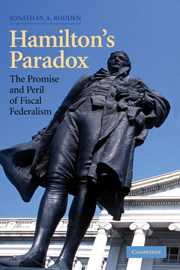Book contents
- Frontmatter
- Contents
- Preface
- Acknowledgments
- 1 INTRODUCTION AND OVERVIEW
- 2 PROMISE AND PERIL: INTELLECTUAL HISTORY
- 3 SOVEREIGNTY AND COMMITMENT
- 4 THE POWER OF THE PURSE: INTERGOVERNMENTAL GRANTS AND FISCAL DISCIPLINE
- 5 DISEASE OR CURE? POLITICAL PARTIES AND FISCAL DISCIPLINE
- 6 AN APPROACH TO COMPARATIVE CASE STUDIES
- 7 FISCAL FEDERALISM AND BAILOUTS IN POSTWAR GERMANY
- 8 THE CRISIS OF FISCAL FEDERALISM IN BRAZIL
- 9 THE CHALLENGE OF REFORM IN FEDERATIONS
- 10 THE ORIGINS OF SUBNATIONAL SOVEREIGNTY
- 11 CONCLUSIONS
- References
- Index
- Titles in the series
8 - THE CRISIS OF FISCAL FEDERALISM IN BRAZIL
Published online by Cambridge University Press: 14 January 2010
- Frontmatter
- Contents
- Preface
- Acknowledgments
- 1 INTRODUCTION AND OVERVIEW
- 2 PROMISE AND PERIL: INTELLECTUAL HISTORY
- 3 SOVEREIGNTY AND COMMITMENT
- 4 THE POWER OF THE PURSE: INTERGOVERNMENTAL GRANTS AND FISCAL DISCIPLINE
- 5 DISEASE OR CURE? POLITICAL PARTIES AND FISCAL DISCIPLINE
- 6 AN APPROACH TO COMPARATIVE CASE STUDIES
- 7 FISCAL FEDERALISM AND BAILOUTS IN POSTWAR GERMANY
- 8 THE CRISIS OF FISCAL FEDERALISM IN BRAZIL
- 9 THE CHALLENGE OF REFORM IN FEDERATIONS
- 10 THE ORIGINS OF SUBNATIONAL SOVEREIGNTY
- 11 CONCLUSIONS
- References
- Index
- Titles in the series
Summary
No Alexander Hamilton has arisen … to compel all parties to put aside their petty jealousies and sacrifice their private interests to the welfare of the (Brazilian) Union.
Haggard's Monthly Report, June 1907The problem of unconstrained borrowing by states in the presence of a perceived federal guarantee was a mere annoyance in postwar Germany when compared with Brazil in the 1990s. While unsustainable borrowing and bailouts were limited to the smallest states in Germany, this case study discusses a pattern of fiscal indiscipline and bailouts that extended to a majority of Brazilian states. Moreover, the crisis of fiscal federalism in Brazil had direct implications for macroeconomic stability.
Brazil is the most decentralized country in the developing world. It has a long history of federalism and decentralization and has become considerably more decentralized over the last two decades. On average during the 1990s, the states and municipalities were responsible for over one-third of all revenue collections, close to half of all public consumption, and almost 40 percent of the public sector's net debt stock. Political and fiscal decentralization were key components of Brazil's transition to democracy in the 1980s. An examination of Brazil's experiences since then demonstrates the severity of the challenges for macroeconomic management posed by fiscal decentralization in the context of inequality, political fragmentation, and robust federalism. Above all, Brazil has been forced to deal with one of the most serious and persistent subnational debt problems in the world.
- Type
- Chapter
- Information
- Hamilton's ParadoxThe Promise and Peril of Fiscal Federalism, pp. 188 - 225Publisher: Cambridge University PressPrint publication year: 2005

